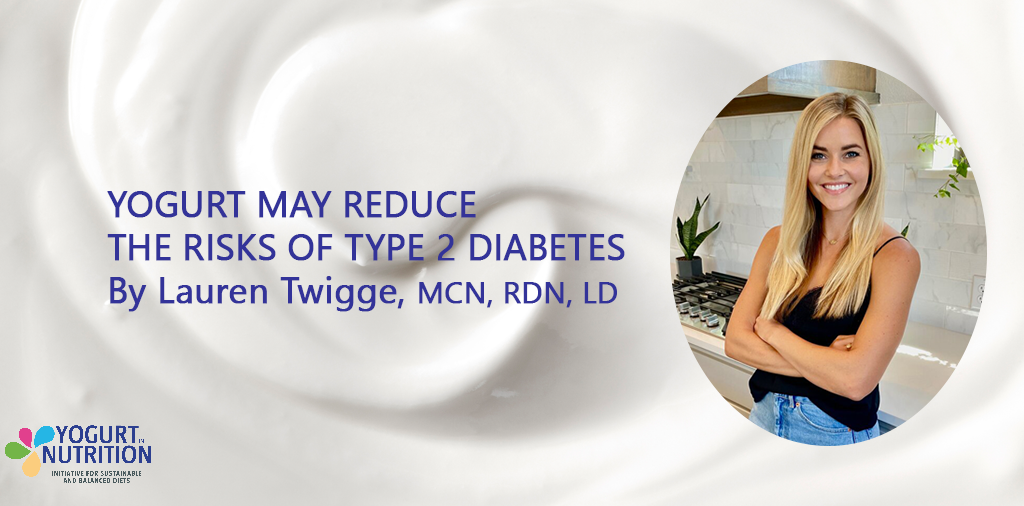In March 2024, the U.S. Food and Drug Administration (FDA) has approved a qualified health claim regarding the consumption of yogurt and reduced risk of type 2 diabetes (T2D) : “Eating yogurt regularly, at least 2 cups (3 servings) per week, may reduce the risk of type 2 diabetes according to limited scientific evidence.”
Lauren Twigge, registered and licensed Dietitian, shared her reaction on this announcement with us.
Voir cette publication sur Instagram
The FDA announced that it is going to allow yogurt makers to include the qualified health claim that regular consumption of yogurt may reduce the risk of type 2 diabetes (1). This is a big announcement considering that 537 million adults live with Type 2 diabetes worldwide and that number is expected to increase (2).
Effects shown in many studies and reviews
Some of the studies that were used to support this claim including two reviews (3,4) show an inverse relationship between dairy consumption and type 2 diabetes. In fact, one of the reviews showed that a 50 g/day increase of yogurt consumption led to a 7% lower risk for developing type 2 diabetes.
This claim can be added to any yogurt brand, regardless of added sugar or fat content. It is always good to be mindful of limiting added sugar and being aware of the sugar content in the yogurt you are regularly consuming… especially if you aim for the 3 servings of yogurt per week recommendation.
This inverse relationship between yogurt and type 2 diabetes has not been attributed to one specific nutrient within yogurt but has been linked to the food as a whole.
A great example of dairy matrix
This is a great example of the dairy matrix which is a concept I discussed a while back in my profile reminding us us that foods, like yogurt, function as more than just one nutrient in our body. Plain yogurt is a low glycemic food that contains many healthful nutrients like probiotics, calcium, vitamin D, high-quality protein and many other bioactive components that work together to support our health and reduce risk for diseases like type 2 diabetes. With a large number of americans living with type 2 diabetes and potentially even more that are not diagnosed, it is a great news that FDA flags what foods we can include in the diet to help reduce this burden.
Yogurt is an incredibly diverse food that can be added to recipes like parfaits, smoothies, dressing, soups, and more. Next time you’re at the store, be sure to add yogurt to your cart!
Sources:
-
FDA Announces Qualified Health Claim for Yogurt and Reduced Risk of Type 2 Diabetes
-
IDF Diabetes Atlas Report
-
Feng Y, Zhao Y, Liu J, Huang Z, Yang X, Qin P, Chen C, Luo X, Li Y, Wu Y, Li X, Huang H, Hu F, Hu D, Liu Y, Zhang M. Consumption of Dairy Products and the Risk of Overweight or Obesity, Hypertension, and Type 2 Diabetes Mellitus: A Dose-Response Meta-Analysis and Systematic Review of Cohort Studies. Adv Nutr. 2022 Dec 22;13(6):2165-2179.
-
Aune D, Norat T, Romundstad P, Vatten LJ. Dairy products and the risk of type 2 diabetes: a systematic review and dose-response meta-analysis of cohort studies. Am J Clin Nutr. 2013 Oct;98(4):1066-83.
 Lauren Twigge is a Dallas based registered and licensed Dietitian with a Master’s degree in Clinical Nutrition and a bachelor’s degree in Animal Science. Along with running her own nutrition company and working with private clients, Lauren works as social media dietitian, recipe developer, blogger, and brand ambassador. Lauren was born and raised in a family of farmers located in central California and is an outspoken supporter of the agricultural industry. Growing up on a dairy and being raised around farming her whole life has given Lauren a unique perspective on where our food comes from and her passion is to work at the crux of agriculture and human nutrition to fight misinformation and give consumers back their food confidence. Lauren is on Instagram @nutrition.at.its.roots and educates on a variety of health topics including the truth about the agricultural industry, education on where our food comes, and discussing the role that various agricultural products, like milk, can play in a healthy diet!
Lauren Twigge is a Dallas based registered and licensed Dietitian with a Master’s degree in Clinical Nutrition and a bachelor’s degree in Animal Science. Along with running her own nutrition company and working with private clients, Lauren works as social media dietitian, recipe developer, blogger, and brand ambassador. Lauren was born and raised in a family of farmers located in central California and is an outspoken supporter of the agricultural industry. Growing up on a dairy and being raised around farming her whole life has given Lauren a unique perspective on where our food comes from and her passion is to work at the crux of agriculture and human nutrition to fight misinformation and give consumers back their food confidence. Lauren is on Instagram @nutrition.at.its.roots and educates on a variety of health topics including the truth about the agricultural industry, education on where our food comes, and discussing the role that various agricultural products, like milk, can play in a healthy diet!



